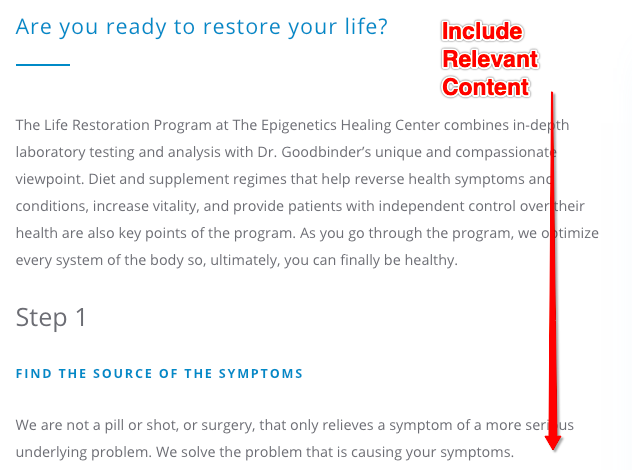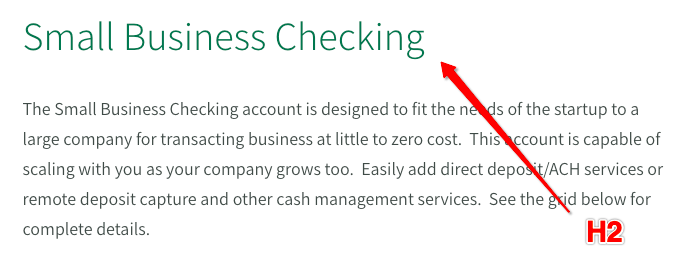You’ve probably heard it in passing from your friends, fellow business owners, and reps at your agency. “You definitely need SEO for your website!”
We know you’ve heard it. But it’s OK to not feel ready to sign onto a full SEO marketing campaign. Take a deep breathe and know there are still plenty of steps you can take on your own to avoid ignoring this invaluable tool altogether.
Website Considerations That Matter for SEO
Google literally takes hundreds of factors into consideration when deciding how and where to rank your website. Even the most advanced SEO specialist won’t have time to optimize for all of them right off the bat.
If you do SEO with the mindset of making it easier for Google to do its job, the engine is going to reward you with better rankings. So before you jump into doing any work on your own, take the time to understand what Google wants most.
Google’s #1 goal is to be able to connect users with the most important content for their queries. It does this by being able to read your site and easily, determine what it is about and rank it against pages with similar or related information.
When you consider what would make Google’s life easiest (and help it make the most money), you can get a feel for why SEO works the way that it does. In a nutshell, Google wants your site to be user-friendly, relevant and readable (to both Google and the reader).
That being said, you should be able to see real rankings improvements if you focus on making our website technically sound (so Google can find it), as well as ensuring your site is full of relevant, professionally written content that answers the questions searchers are asking.
It also helps to make everything on the site attractive, user-friendly and responsive so users stick around to actually read it.
Top 7 Steps to Set Up Website SEO Today
I get this question a lot: “What is the most important thing I can do to improve my SEO today?”
So many factors work together in SEO, which makes it hard to say one thing will make the difference alone. But certain elements absolutely matter more than others. Here are seven of them.
1. Image and Load-Speed Optimizations

When it comes to the images on your site, size does matter. With the rise in mobile searches (there are more of them now than desktop), Google places heavy emphasis on your sites’ load speed. For the best effect on your SEO, get your page load time down to less than 2 seconds (here is a free online tool to check where you are at now).
If you aren’t there yet, try reducing the size of your site’s images to the exact dimensions that you need for its placement, no more. Once your images are as small as they can be, be sure to add appropriate titles and alt-text to each one to help Google know what they are.
2. Content and Keywords

Some basic keyword research will help you understand what searchers are typing in when they are looking for something related to your site. You can use any number of tools, including Google Keyword Planner, to find suggestions relevant to your business.
Once you have your core keywords, make sure your homepage and other service pages on your site contain these keyword phrases somewhere within the content, potentially in a headline or towards the top of a paragraph.
Try to fill the pages you most want to rank with well-written content loosely modeled after other pages that rank well for your keywords (but please, do not plagiarize). A good goal to shoot for initially is around 400-600 words of good content per page.
3. URLs and Title Tags

If you can, try and get the keyword phrase you’re targeting into your URL structure without making the whole URL too long. It is one more element Google reads to try and determine the contents of a page.
Your title tag is the main part of your page’s listing on the search engine results page (SERP). If you have an SEO plug-in for your WordPress site, you can add this easily to your pages in the backend of your site.
4. Headings

In addition to breaking up the text on your page and making it more readable, headings (like h f1s and h2s) signal to Google what the page is about. Add your target keywords into your headings strategically, without sounding awkward or like you are keyword stuffing. Focus on doing it in a way that flows and makes sense to the reader. Meta Descriptions
Meta descriptions help searchers understand what is on the page when they see it in a search result, which will in-turn improve your click-thru rate. Make sure all of your pages have one of these written that gives a clear description of what is on the page and includes a Call To Action (CTA). You can do this easily by installing an SEO plug-in to your WordPress site.
5. Internal Linking

Internal linking, or linking to other pages on your website, sends valuable signals to Google about what your page is about. It also passes information and web traffic between pages on your website, helping improve your traffic and keeping people on the page longer.
Go through your top pages and spend time adding internal links where relevant. Make sure the anchor text (what is in blue) includes a key phrase identifying what the linked page is about.
6. Meta Descriptions

Meta descriptions help searchers understand what is on the page when they see it in a search result, which will in-turn improve your click-thru rate. Make sure all of your pages have one of these written that gives a clear description of what is on the page and includes a Call To Action (CTA). You can do this easily by installing an SEO plug-in to your WordPress site.
7. Submit Your Sitemap to Google

Finally, submitting your sitemap to Google tells Google which pages to look at on your website. You don’t have to do this in order to get Google to crawl your website, but submitting your sitemap helps speed things up and ensures Google gets to the right pages that you want to see ranked. You can submit your sitemap through Google Search Console.
The 8-Pillars of SEO
Need to go further with your SEO strategy? Our SEO team has developed a unique auditing strategy to determine how your site stacks up to the 8 most important factors that are affecting your SEO.
Keep reading to learn more about Venta’s 8 Pillars of SEO to get a better feel for how this comprehensive process works to improve your search engine rankings from all sides.

